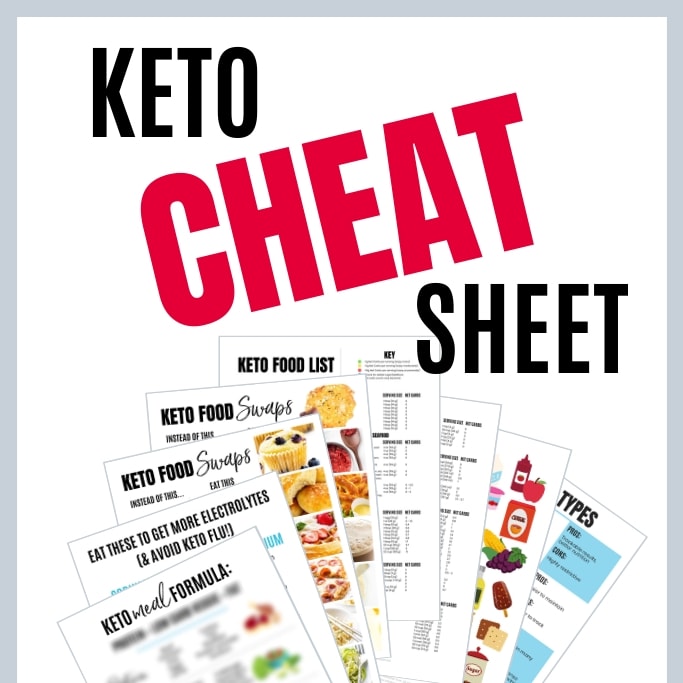
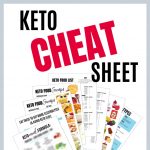
The most complete keto cheat sheet you'll ever need! Includes a detailed keto food list (100+ items), dozens of keto food swaps, the keto meal formula, electrolyte summary, different types of keto, and more, all available in a convenient keto cheat sheet printable pdf.
By Maya KrampfAffiliate links for products I use help keep my content free. Ads are not my endorsements. See my disclosure and how I develop recipes in my kitchen. For an ad-free experience and more perks, try Wholesome Yum Plus.

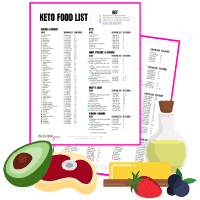
Even though I have a great guide to starting a keto diet, people often ask me for a quick keto cheat sheet they can use. That’s why I created this simple keto diet cheat sheet, so that you can have all the info you need handy. We’ll cover the basic keto formula for building meals, foods to eat and to avoid, delicious keto swaps for high-carb foods, electrolyte basics, and 4 ways to follow the keto lifestyle.
You can keep reading to view this info, or download my keto cheat sheet printable pdf to print out or save ad-free on any device (plus the pdf has more details!).
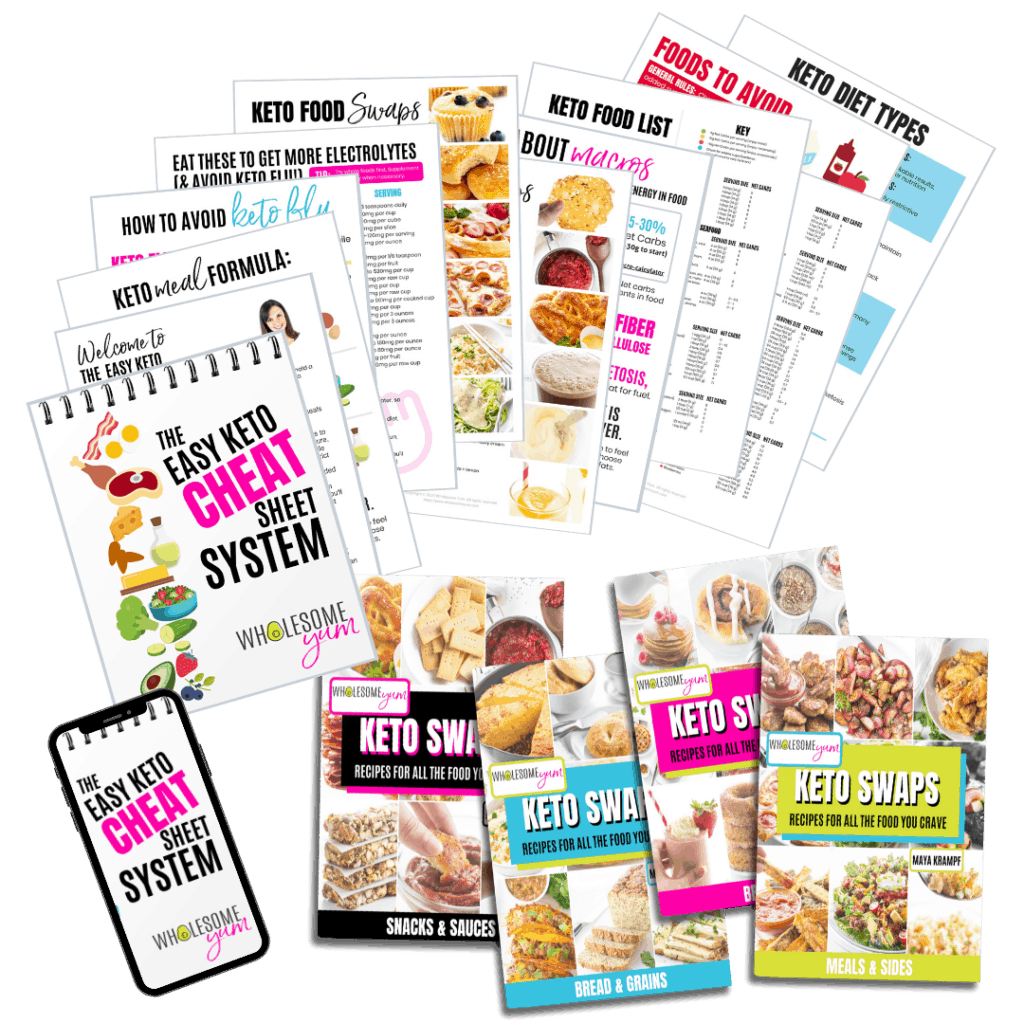
Get all this information and MORE in convenient printer-friendly format – 13 cheat sheet pages you can take with you anywhere or keep in your kitchen, plus 4 recipe cookbooks! Includes:
Eating keto doesn’t have to be complicated! While there are plenty of delicious easy keto recipes to choose from, you don’t even have to cook from a recipe to get started.
Simply follow the keto cheat sheet formula of protein + veggie + fat for your meals.
Be sure to choose a moderate amount of protein, only low carb vegetables (mostly ones that grow above ground), and generous fat to attain an optimal macro ratio. That’s approximately 60-75% of calories from fat, 20-25% protein, and 5-10% from carbohydrates. The table below will give you ideas for what to choose.
| Pick A Protein | Pick A Veggie | Add Fat |
|---|---|---|
| Beef Chicken Pork Eggs Lamb Turkey Fish Shellfish Protein powder Venison | Cauliflower Broccoli Zucchini Leafy Greens Cucumbers Brussels Sprouts Cabbage Asparagus Radishes Bell Peppers Jicama Celery | Butter Avocado Oil Cheese Bacon Avocado Lard Ghee Mayo Nuts MCT Oil |
Macros are macronutrients for short. They include fat, protein, and carbohydrates.
You can calculate your own macros using the macro calculator, but the macro keto cheat sheet below will explain how to look at macros when following a keto lifestyle.
Keeping carbs low is what gets you into ketosis and keeps you there. Ketosis means that you’re using fat as your primary energy source instead of sugar, and requires keeping carbs very low.
A good starting point is 20-25 grams net carbs per day, but you can experiment after a few weeks to see if your body stays in ketosis at higher levels. People who are very active may be able to do more and stay in ketosis, up to around 50 grams per day.
“Carbs are a limit” means that you set a limit for how many carbs to eat per day and don’t exceed it. You don’t have to hit that limit, so if you’re under that’s okay, just don’t go over. Ideally most of your carbs would come from low carb vegetables, and if you’re eating enough veggies, you’ll usually get close to the limit naturally.
A common misconception is that reaching ketosis requires a certain macro ratio, but it’s really only restricting your carb intake that gets you there [*]. In the absence of sufficient carbs to use as energy, the body will switch to using fat as fuel. This is called the metabolic state of ketosis.
Protein is made up of amino acids, the building blocks of all our cells. It’s a crucial for keeping our muscles strong and for many cellular functions [*].
“Protein is a goal” means that you always want to eat enough protein to reach the goal each day, but not exceed it too much. You want enough for your needs, but excess protein can trigger gluconeogenesis, which is protein being converted to sugar [*] and can kick you out of ketosis.
Fat is the primary macronutrient in a keto lifestyle, because being in ketosis means that fat is your primary fuel source. Fat as a fuel source will come from your food, and if you are losing weight, from your body.
A big advantage of a keto lifestyle is the high fat intake. It keeps you full and satisfied, making it easier to stick to, and using it as the primary fuel source makes it easier on your body to burn body fat, with a lower chance of breaking down your muscle (provided you get enough protein).
Aside from reaching your protein goal and limiting your carbs, the remainder of your calories on a keto diet comes from fat.
Don’t fear fat – it’s your main energy source on keto, and getting enough of it trains your body to use fat for fuel instead of sugar. That means that as long as you are not overdoing your overall calorie intake, you’ll efficiently burn your body fat for fuel as well.
“Fat is a lever” means that you can increase or decrease your fat intake depending on your goals and hunger levels. Increase it (along with exercise) to gain muscle, or decrease it to lose weight.
One of my favorite challenges is creating recipes, or just discovering, keto food swaps. These are delicious keto replacements for traditionally high-carb or high-sugar foods.
So, I created this keto diet cheat sheet with all the swaps in one place! I also have more keto food swaps in my Easy Keto Cookbook.
| Instead Of This… | Eat This |
|---|---|
| Pancakes | Almond flour pancakes or coconut flour pancakes |
| Oatmeal | Keto oatmeal with hemp seeds |
| Cinnamon rolls | Fathead cinnamon rolls |
| Cereal | Keto nut granola |
| Muffins | Almond flour muffins or coconut flour muffins |
| Donuts | Almond flour donuts |
| Scones | Almond flour scones |
| High-sugar smoothies | Smoothie with berries or avocado |
| Hash browns | Cauliflower hash browns |
| Breakfast casserole | Breakfast casserole with no potatoes |
| Egg whites | Whole eggs |
| Turkey bacon | Bacon |
| Waffles | Chaffles |
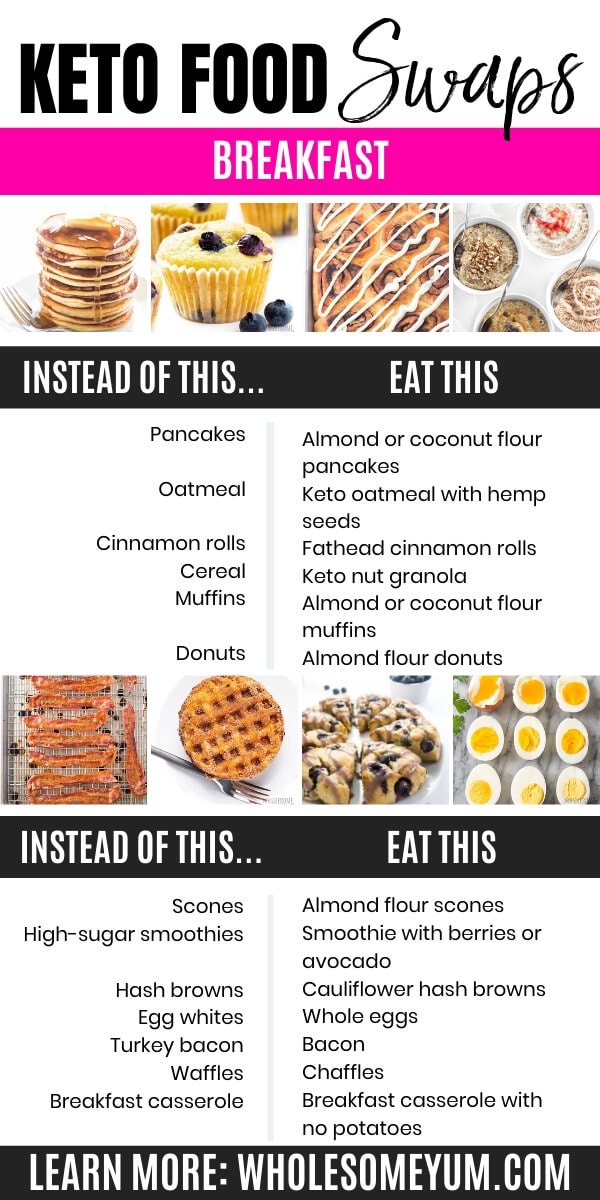
| Instead Of This… | Eat This |
|---|---|
| Bagels | Fathead bagels |
| English muffin | Almond flour English muffin |
| White bread | Keto white bread |
| Multigrain bread | Coconut flour bread with seeds |
| Tortillas for wraps | Coconut flour tortillas |
| Corn taco shells | Cheddar cheese taco shells |
| Burger buns | Oopsie rolls, portobello mushroom caps |
| Breadsticks | Cauliflower breadsticks |
| Biscuits | Almond flour biscuits |
| Cornbread | Almond flour cornbread |
| Croutons | Parmesan crisps |
| Rice | Cauliflower rice, konjac rice |
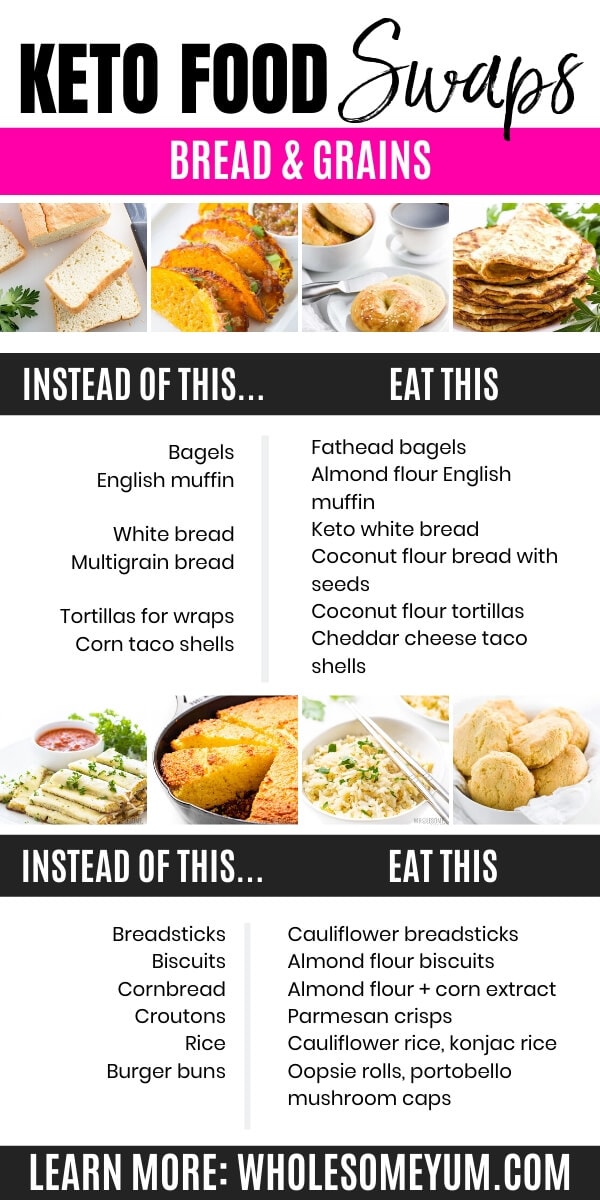
| Instead Of This… | Eat This |
|---|---|
| Breaded wings | Crispy air fryer wings (unbreaded) |
| Low-fat meat & poultry | High-fat cuts, or cook low-fat cuts with fat |
| Mashed potatoes | Mashed cauliflower |
| Roasted potatoes | Roasted or fried radishes |
| Tacos | Taco salad |
| Pizza | Fathead crust, chicken crust, or cauliflower crust pizza |
| Lasagna | Eggplant lasagna |
| Potato salad | Cauliflower “potato” salad |
| French fries | Jicama, rutabaga, or zucchini fries |
| Tater tots | Cauliflower tots |
| Wraps | Lettuce wraps, almond flour tortillas |
| Sushi | Naruto-style or homemade rice-free sushi |
| Breaded chicken or fish | Breaded cuts with almond flour or pork rinds |
| Spaghetti | Zoodles, spaghetti squash, shirataki noodles, kelp noodles |
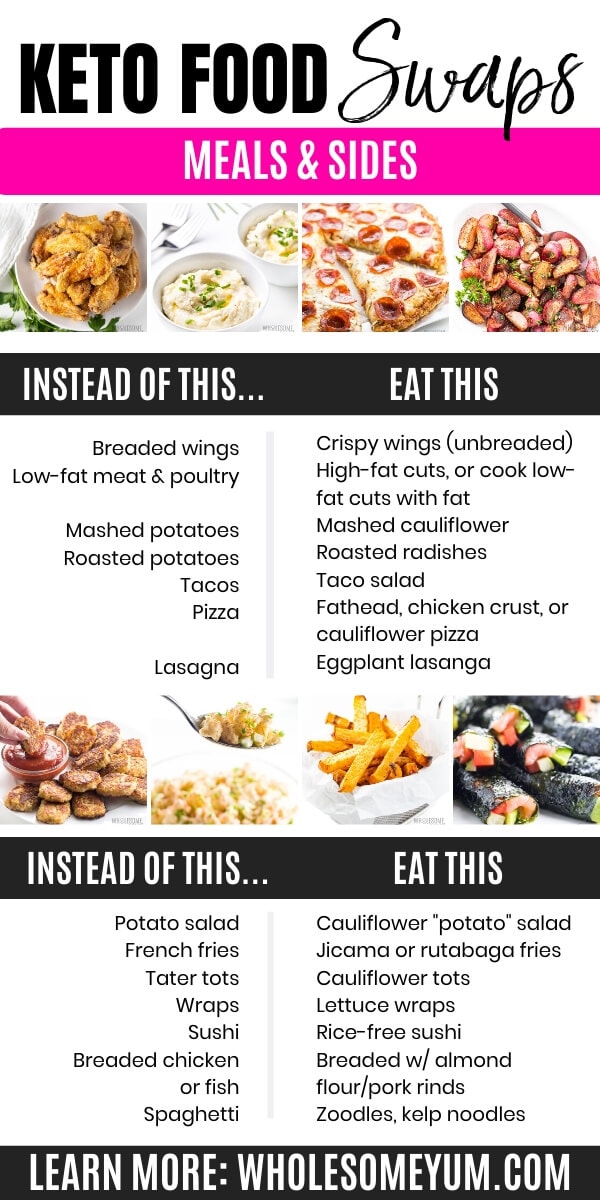
| Instead Of This… | Eat This |
|---|---|
| Nachos | Cheese crisps |
| High-sugar fruit | Berries & other keto fruits |
| Crackers | Almond flour crackers |
| Hummus | Cauliflower hummus |
| Soft pretzels | Fathead pretzels |
| Popcorn | Puffed cheese |
| Granola bars | Grain-free granola bars |
| Jam | Sugar-free berry chia jam |
| Sweet fruity yogurt | Full-fat plain Greek yogurt with berries |
| Sweet salad dressing | Ranch, blue cheese, or plain vinaigrette |
| Ketchup | Mustard and/or sugar-free ketchup |
| BBQ sauce | Sugar-free BBQ sauce |
| Sweetened peanut butter | Natural, sugar-free nut butters |
| Light mayo | Avocado oil mayo |
| Maple syrup | Sugar-free, maple flavored syrup |
| Potato chips | Zucchini chips, pepperoni chips, pork rinds |
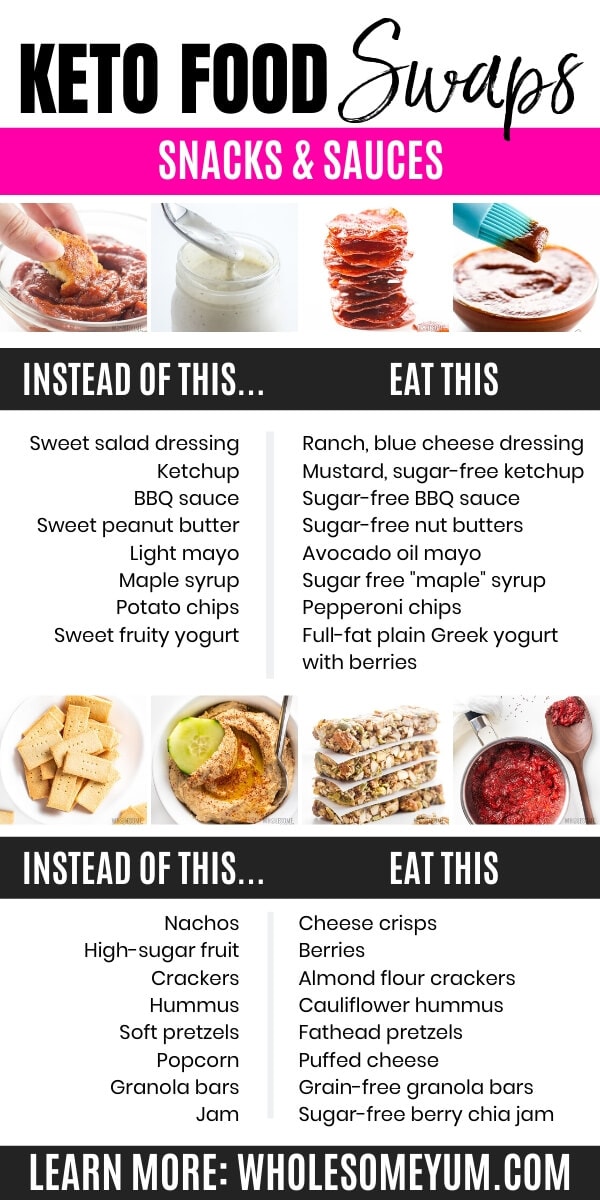
| Instead Of This… | Eat This |
|---|---|
| Sugar | Monk fruit or allulose |
| Powdered sugar | Powdered monk fruit or allulose |
| White flour | Almond or Coconut flour (use in tested recipes) |
| Making baked goods soft/chewy | Xanthan gum, flax seed meal, psyllium husk powder |
| Breadcrumbs | Pork rinds or almond flour |
| Margarine | Butter, coconut oil, or ghee |
| Vegetable oil | Olive or avocado oil |
| Bananas | Banana extract |
| Chocolate chips | Sugar-free chocolate chips |
| Cornstarch or flour roux | Xanthan gum or gelatin powder (used at the end) |
| Simple syrup | Dissolve monk fruit allulose blend in water over heat |
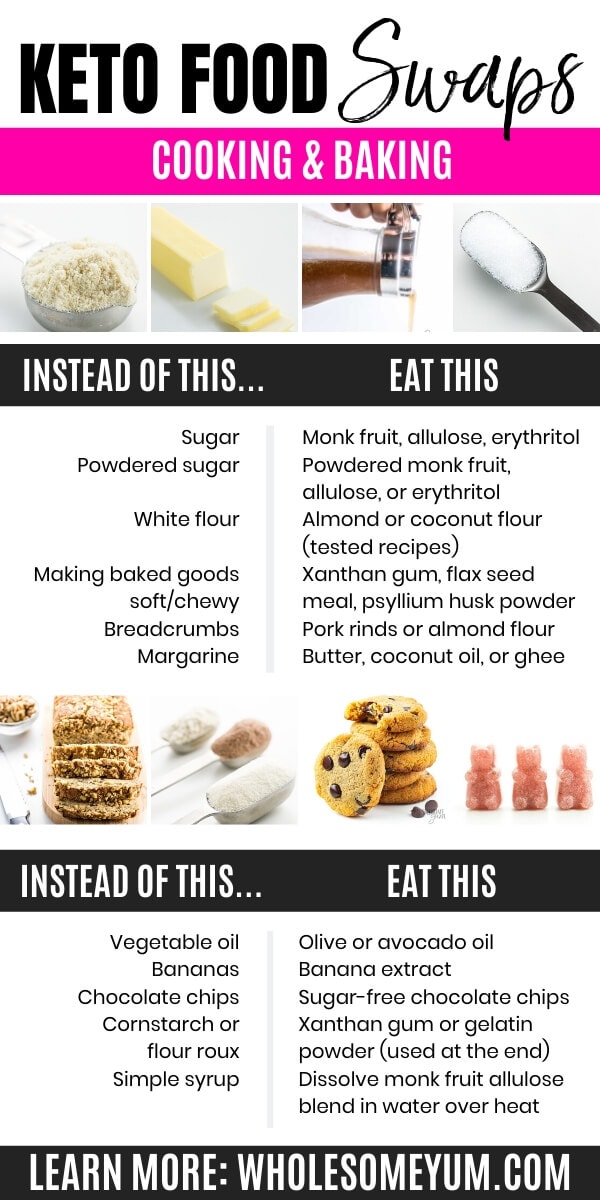
| Instead Of This… | Eat This |
|---|---|
| Lemonade | Water with lemon |
| Soda | Flavored sparkling water |
| Milk | Almond milk, coconut milk, heavy cream |
| Latte | Butter coffee |
| Coffee creamer | Heavy cream |
| Sweet wine | Dry wine |
| Beer | Ultra light beer |
| Mixed drinks | Hard liquor with soda + lemon |
If you’re looking specifically for keto alcohol options, browse the full keto alcohol guide.
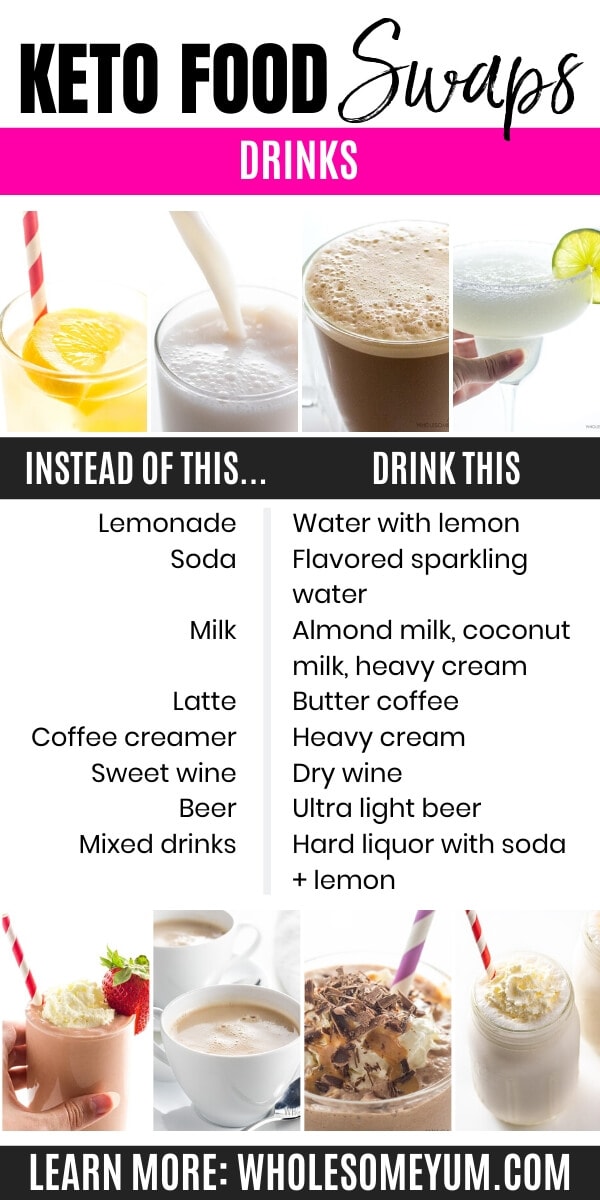
When looking for a keto cheat sheet printable, the most-requested information is a keto food list.
The great thing is that keto doesn’t have to feel restrictive. It’s incredibly satisfying and there’s such a wide variety of foods you can eat!
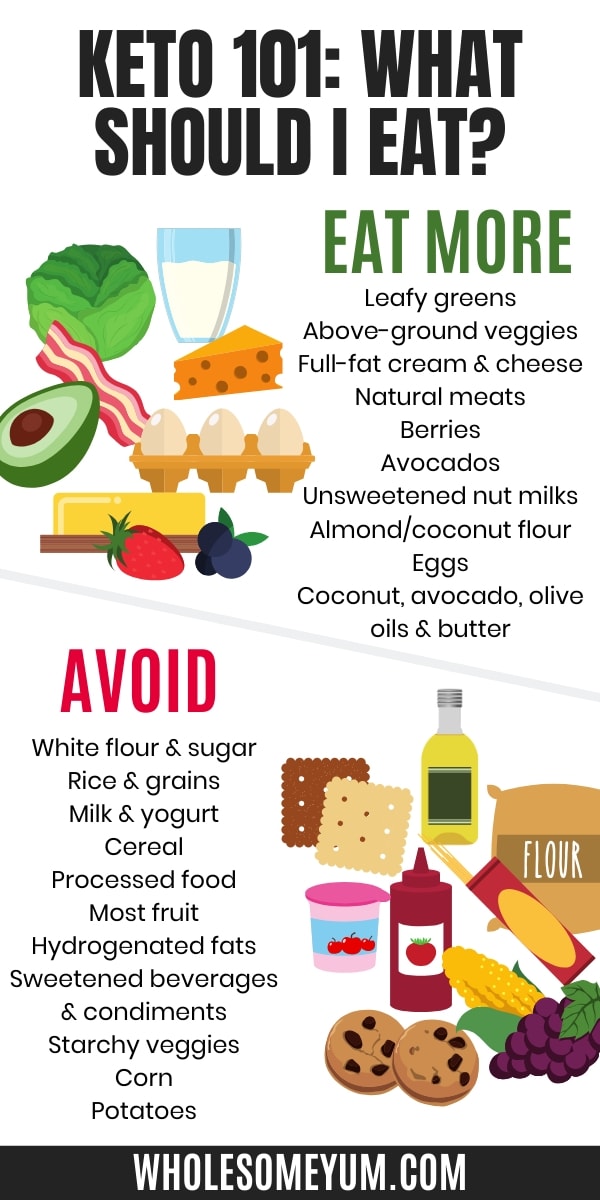
That’s the short keto diet cheat sheet version of all the keto food categories, but I recommend downloading the full Keto Cheat Sheet System. It includes a super detailed printable keto food list with over 100 items, including 2 color-coded pages with net carb counts, along with 6 more pages of keto cheat sheets:

Getting enough electrolytes is crucial for anyone, but especially so on a keto diet. The reason is that ketosis has a diuretic effect, which increases excretion of water and electrolytes, especially sodium [*]. This is often the cause of the keto flu.
For more details on electrolytes and avoiding keto flu, check out the full keto flu guide here.
The important thing to know about electrolytes is that replenishing them will keep keto flu away and keep your body functioning well. I always recommend an electrolyte drink and whole food sources of anything your body needs before resorting to supplements, so I made a list of what to eat to get each of the 3 major electrolytes – sodium, magnesium and potassium.
Here’s your keto diet cheat sheet for getting electrolytes from food:
| Sodium | Magnesium | Potassium |
|---|---|---|
| Bone broth Boullion cubes Bacon Salted nuts Pickles | Seaweed Seeds Nuts Avocado Leafy greens | Potassium chloride Avocado Bone broth Spinach Broccoli Mushrooms Beef Pork |
People follow a keto lifestyle for different reasons. Some do it just to lose weight, others are after better overall health, increased energy, and reduced inflammation.
Strictly speaking, the defining factor of a keto diet is the metabolic state of ketosis, which is achieved by restricting carbs. However, many people (myself included) also reduce or eliminate processed, inflammatory, or low-nutrient foods.
Below is your keto cheat sheet summary of the different ways that people follow keto. You choose what works best for your goals and lifestyle!
For a more detailed listing of these different types of keto with pros and cons, grab the Easy Keto Cheat Sheet Printable PDF below!
Get all this information and MORE in convenient printer-friendly format – 13 cheat sheet pages you can take with you anywhere or keep in your kitchen, plus 4 recipe cookbooks! Includes:

Published Mar 13, 2020 Filed Under: Keto ArticlesKeto Recipes Keto
I’m a recipe developer and USA Today best-selling cookbook author, and I’ve been creating easy, healthy recipes using whole, real food for more than a decade — all with 10 ingredients or less! Learn about how I develop recipes here.
I love vegetables, a perfectly cooked filet mignon, and a good cup of coffee. I’m passionate about healthy eating without refined sugar, so I created Wholesome Yum Foods, a line of zero sugar ingredients for cooking and baking.